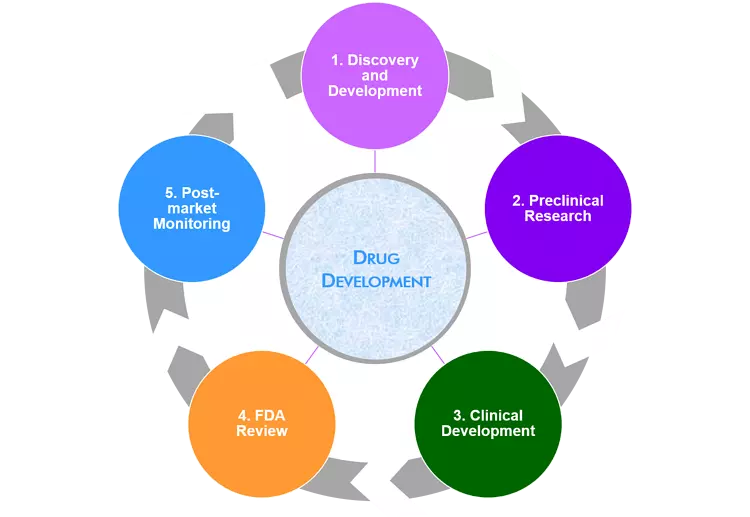Learn how Artificial Intelligence is revolutionizing the drug development process, speeding up the development of new treatments and saving lives.

Artificial intelligence (AI) technology is transforming the healthcare industry, and drug development is no exception. With its ability to analyze vast amounts of data and identify patterns, AI is making it easier and faster for pharmaceutical companies to discover and develop new drugs.
In this article, we will explore the drug development process, and its importance, provide examples and case studies of how it is being used, and discuss the future implications of this technology.
Drug development process-
The drug development process is a lengthy, complex, and highly regulated process that involves several stages, including discovery, preclinical research, clinical trials, and regulatory approval. Here’s a detailed overview of each stage:

Discovery:
In the discovery stage, researchers identify potential drug targets by studying disease mechanisms and exploring compounds that may have therapeutic potential. This stage often involves computer modeling, high-throughput screening, and other laboratory techniques to identify compounds that may be effective in treating a particular disease.
Preclinical research:
Once a compound has been identified as a potential drug candidate, preclinical research begins. In this stage, the compound is tested in vitro (in cells) and in vivo (in animal models) to evaluate its safety, toxicity, and efficacy. This stage is crucial for establishing proof of concept and identifying any potential safety concerns before moving on to clinical trials.
Clinical trials:
If a drug candidate passes preclinical testing, it can move on to clinical trials. Clinical trials are typically divided into three phases:
- Phase 1: This phase involves testing the drug candidate in a small group of healthy volunteers to evaluate its safety, dosage, and potential side effects.
- Phase 2: In this phase, the drug candidate is tested in a larger group of patients with the target disease to evaluate its efficacy and optimal dosage.
- Phase 3: In the final phase, the drug candidate is tested in an even larger group of patients to confirm its efficacy and monitor any potential side effects.
Regulatory approval:
If a drug candidate passes all three phases of clinical trials and is shown to be safe and effective, the pharmaceutical company can submit a New Drug Application (NDA) to a regulatory agency, such as the FDA in the United States. The regulatory agency evaluates the NDA and determines whether the drug candidate should be approved for commercial use.
Post-Market surveillance:
Even after a drug has been approved and is on the market, it is still subject to ongoing monitoring and surveillance to identify any potential safety concerns that may arise after the drug has been approved for use.
The Importance of AI in drug development-
Drug development is a complex process that can take years and billions of dollars to complete. In traditional drug development, scientists would spend years researching a specific disease, identifying potential drug targets, and then testing and optimizing compounds to find the most effective treatment.
However, this process is time-consuming and expensive, with a high failure rate. AI can help accelerate the drug discovery process by analyzing large amounts of data and identifying patterns that humans may miss.

Case Studies of AI in Drug Development-
One of the most significant success stories of AI in drug development is the development of a new antibiotic by the pharmaceutical company, Novo Nordisk. The company used AI to analyze large amounts of genomic data to identify potential drug targets.
They then used AI to design a new antibiotic that could target these specific genes. The result was a new antibiotic that was effective against several antibiotic-resistant strains of bacteria.
Implications for the Future-
AI has the potential to revolutionize drug development and change the way we think about healthcare. With its ability to analyze vast amounts of data and identify patterns, AI can help accelerate the drug discovery process and reduce the time and cost of clinical trials. This could lead to more effective treatments for a range of diseases, including rare and neglected diseases.
Conclusion-
AI technology is revolutionizing drug development by enabling faster, more efficient discovery of new drugs and improving patient outcomes. From drug discovery to clinical trials and drug repurposing, AI is already making a significant impact in the pharmaceutical industry.
Read more: The Role of AI in the Healthcare
Frequently asked questions
How is AI being used in drug development?
Are there any risks or limitations to using AI in drug development?
Are there any ethical concerns related to using AI in drug development?
What are the benefits of using AI in drug development?
How is AI being used to repurpose existing drugs for new treatments?
Is AI replacing human researchers in drug development?
What is the future of AI in drug development?
Question not answered above? Contact us
